Hundreds of people look for attorneys daily, especially in specialty areas like personal injury law. Moreover, over one-third of these potential clients start searching online. They simply go to Google and search for “personal injury lawyers near me” and compare the top results that appear.
You can use traditional ads and pay-per-click online campaigns to drive business, and many law offices do. Unfortunately, these methods are often costly and generate unqualified leads.
There is a better way.
When you build sustainable organic traffic through local SEO, your personal injury law firm will see a short-term boost in business and enjoy the benefits for years to come.
Why Isn’t My Law Office Bringing in Clients?
Websites and social media profiles make your personal injury law office visible worldwide. However, it’s not usually enough for your law office to just be visible to the general public—you need to be visible to the right people.
For you, the “right people” are those in your local area who need legal representation for personal injury claims. But, when these same people search for “personal injury attorneys” on Google, 75 percent will never scroll past the first page of their search results [1].
In other words, if you aren’t “playing the Google game” and spending at least a portion of your marketing budget on website content and local SEO to rank in the top 5, you are missing out on clients that your competitors happily accept.
How can you determine what you need to do in order to appear higher in organic search results?
A gap analysis can help you evaluate your current consumer search market share and compare your performance with your top local competitors.
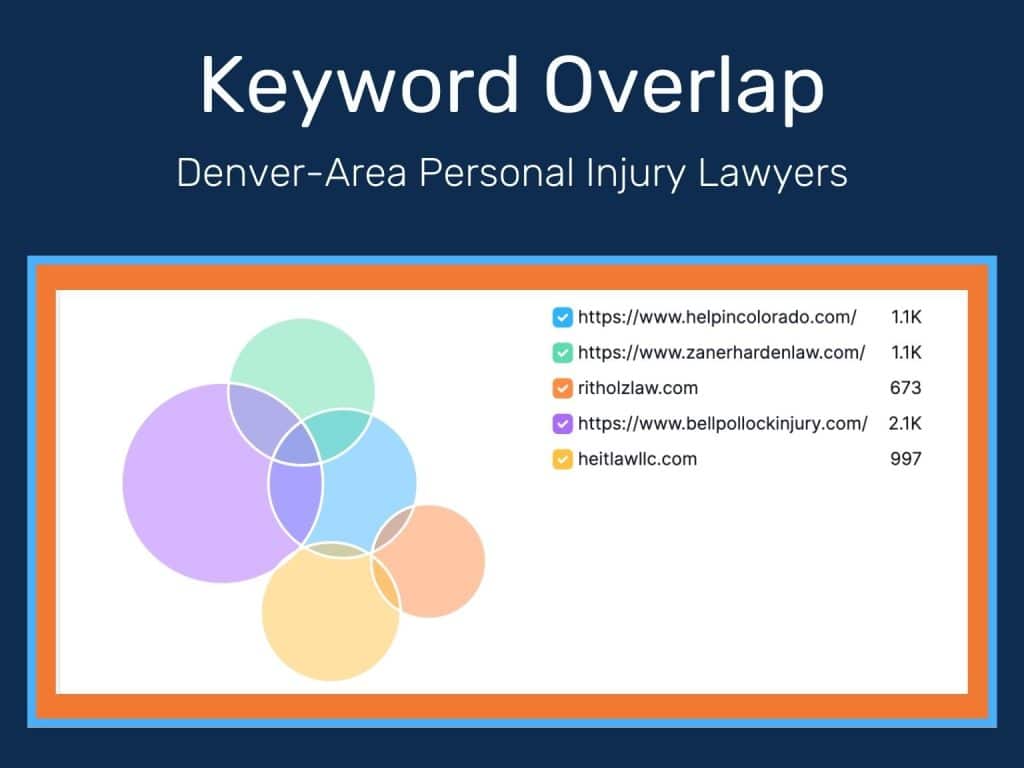
Typically, a gap analysis looks at several metrics to determine how much consumer market share each competitor holds. By comparing the competition to your website’s metrics, you can quickly identify areas to improve your law office’s SEO strategy and optimize your website to boost organic traffic.
Some key comparison areas for a practical SEO gap analysis include:
- Domain Authority (DA) or Domain Rating (DR)
- Words on Homepage (Homepage copy)
- Referring Domains (Backlinks)
- Estimated Organic Monthly Traffic
- Total Number of Web Pages (Crawled Pages)
- Organic Keywords in the Top 100
At InSync Media, we use tools like SEMRush and Ahrefs to perform a competitor gap analysis, then make recommendations on improving a website so you can overpower the competition and start crushing those Google search returns.
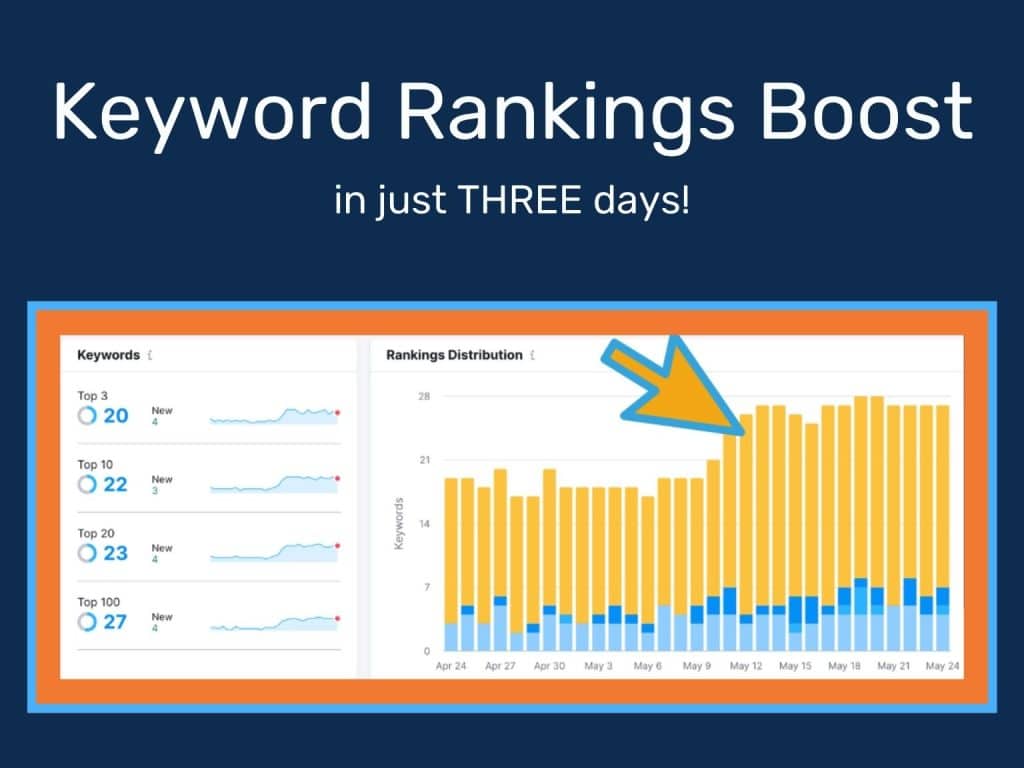
Some common recommendations to improve your gap analysis may include:
- Obtaining high-quality backlinks through guest posts, niche edits, and showcase articles
- Enhancing the written content on your current website pages to increase readability
- Adding new content to your website through long-form blog posts, location-specific landing pages, or service-specific pages
- Removing or revamping “cannibalizing content” so that multiple pages aren’t competing for keywords
- Utilizing schema markup to help Google better understand your website
That may not make sense right now, and that’s OK. When you partner with an SEO marketing agency like InSync Media, we meet you where you are regarding SEO knowledge and cultivate it so your understanding of the jargon grows alongside your business.
What the Heck is SEO?
Most business owners and employees who focus on business growth and marketing have heard of SEO. You probably know that SEO stands for “search engine optimization.” The problem is a lot of misinformation on how to approach SEO, especially regarding location-specific businesses like law firms.
SEO is the general term we apply to any process that helps your website and Google Business Profile gain free, organic traffic through search engine results.
When people use Google, Bing, or other search engines, they typically type in a simple question (called a query). The search engine then displays hundreds of results, but it ranks them based on which web pages it feels best answer the provided query. Therefore, all SEO processes aim for your website to appear as high as possible in the search results for anything related to your services.

There’s always a delicate balance between quality and quantity when playing the SEO game. You must diversify your SEO tactics to see consistent results for your organization.
When we plan an SEO strategy for any of our clients, it typically includes:
- On-page optimization work
- New content generation
- Off-page SEO (backlinking)
- Technical SEO
- Result tracking
Why SEO for Personal Injury Lawyers Matters
The days of the Yellow Pages are long gone for local businesses and service providers. Now, over 85% of customers use Google to find local businesses [2], and nearly 80% of all clicks on Google search results go to the businesses that hold the top 3 positions. These people are in a transactional state of mind, which means they are looking for a business to buy.
These trends are typical across the board, including in service industries like personal injury law. In fact, a recent survey released by the National Law Review found that 96 percent of people who need legal advice or services start by using a search engine [3].
SEO is how personal injury law firms win business today.
SEO Boosts Visibility for Your Personal Injury Law Firm
The primary purpose of search engine optimization is to ensure your website appears at the top of all search results related to personal injury law keywords. You can help boost your search visibility by optimizing the homepage and service pages so they rank for relevant keywords potential clients would use to search for legal services.
When someone performs a search query for “personal injury lawyer near me” or similar terms, Google will provide a sponsored (paid) post, followed by Map Listings (Google Business Profiles), then the top organic search matches.
Earning a sponsored position requires a hefty budget (personal injury keywords in Google Ads generally are more than $50 per click). SEO is a better long-term investment for your marketing dollars—even after ad budgets are exhausted, you will enjoy the benefits of top search results.
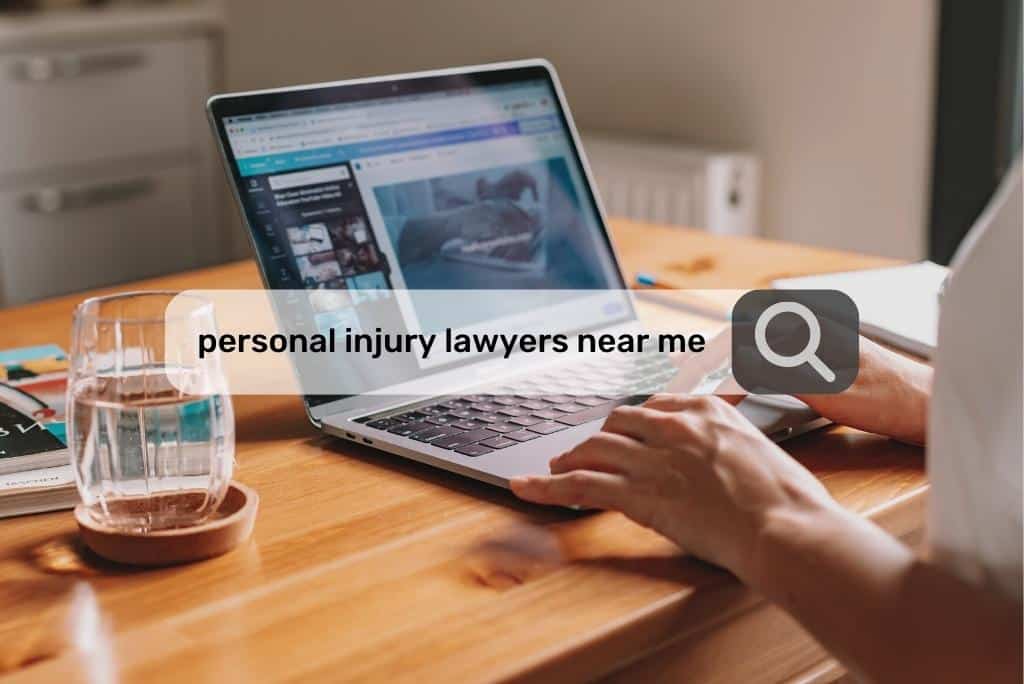
Power of Blogs for SEO
Your homepage isn’t always what helps you gain search visibility. This is because not all clients start their journey in a transactional mindset. Instead, they may search for information gathering. This is where quality content comes into play for your overall personal injury law SEO strategy.
Blog posts give your website more “points of entry” through organic search.
Here’s what we mean: When you build your website, your homepage is the main entry. This is where people come when they search with transactional intent — they need legal representation, and you’re one of the first sites they find when they search for personal injury lawyers in the area. Your service pages help support this mission and let potential clients see the exact services you offer.
On the other hand, blog posts often answer more pointed questions related to personal injury law. So, when someone in your geographic area asks Google, “What happens when I’m in a car accident with an uninsured driver?” they don’t see the homepage of every car accident attorney in the area. Instead, they receive search results that best answer this question.
If you have a well-written, highly optimized blog post that clearly answers this question, chances are this potential client will see your post. Then, after they read the post, they may respond to the call to action you’ve built into the conclusion and contact you for a free consultation.
This is why you need an optimized homepage and quality blog content to maximize your law office’s visibility. The more “points of entry” your website has, the more likely you are to net clients.
SEO Helps Personal Injury Lawyers Establish Trust
Although the primary SEO goal for personal injury lawyers is to turn search volume into clients, it’s not the only objective you can achieve. You can also build credibility and trust through relevant keywords and knowledge sharing across your website.
Personal injury attorneys often combat poor reputations based on stereotypes society imposes on their line of work. Some assume personal injury lawyers are “out for easy money” and “prey on their clients.” However, this isn’t true with most personal injury firms.
Your website can be optimized to rank well for keywords related to personal injury law and establish your online reputation as a trustworthy source of information related to personal injury cases. You can also use your blog posts to provide transparent legal information that helps readers understand what is involved in taking their claim to court.
When potential clients see how much you are willing to do for them before even calling, they are more likely to contact you when ready to hire representation. Furthermore, your off-page SEO efforts, particularly your Google Business Profile work, and reviews, will show potential clients even more credibility.
Strategic SEO for Personal Injury Law
Search engine optimization isn’t a “quick fix” or “simple tune-up” for your website. This is where many people misunderstand SEO and miss out on the results they could see over time. You must commit to a long-term strategy if you want to invest in SEO for your personal injury law firm.
SEO involves three main aspects: on-page SEO, technical SEO, and off-page SEO. These focus points can involve many different things. Still, when it comes to strategic SEO for personal injury lawyers, we typically focus on optimizing the website, boosting your domain authority, and generating new content to keep your site relevant.
Website
Your website is the most critical aspect of any personal injury lawyer’s SEO strategy. Without an optimized website, potential clients won’t find you or if they do find you, they won’t see the value in hiring you to represent them in personal injury cases.
However, personal injury SEO isn’t just about stuffing keywords on a page and hoping for the best. Winning the Google game is about understanding how search engines operate, then making your website as “Google friendly” as possible.
Search engine algorithms evaluate several factors when assigning rank placements to websites.
These factors include:
- Your website’s relevance to the query
- Your website’s functionality (i.e., the ease of navigation)
- The authority of your website/sources
- Your business location concerning the user who searched
When we perform website audits, we consider all of these factors and more. Then, we make recommendations based on our experience with personal injury SEO and market knowledge.
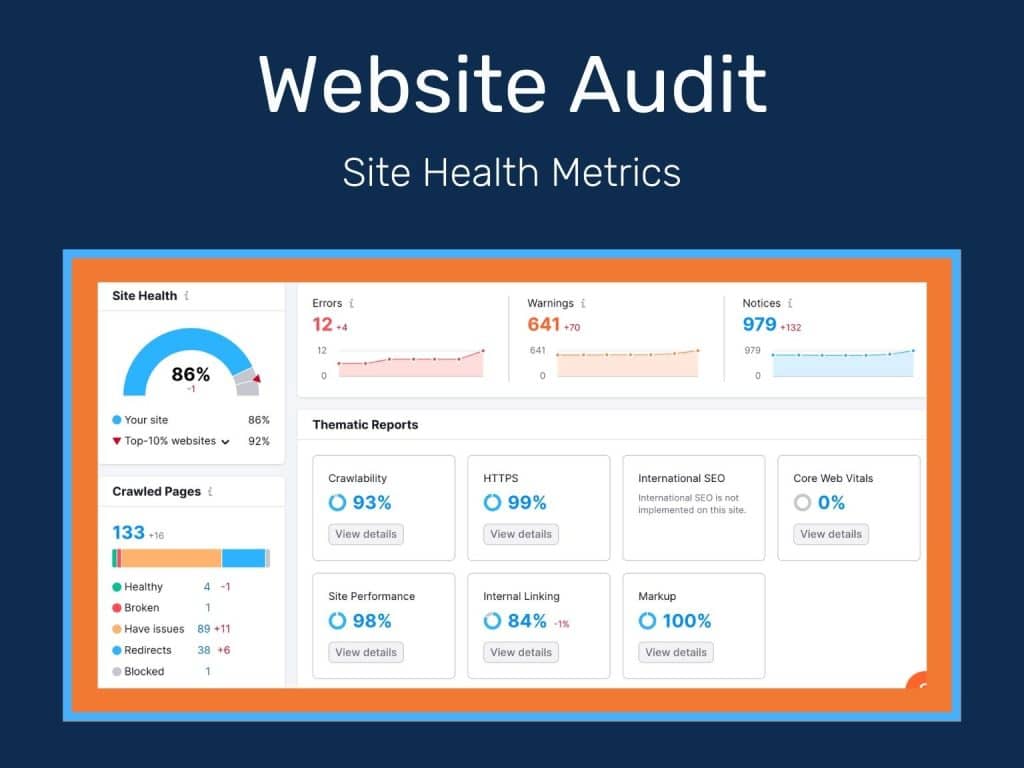
In some cases, small changes in your web copy (the text on your website) may help you appear higher in search. This can involve adding more information to critical pages, working in keywords naturally, or reformatting pages to include subheadings to help explain the text. Adding location-specific keywords to your website or building location-specific pages may also be worthwhile.
Other times, we may see opportunities to optimize your website in other ways, such as through each page’s metadata or your site’s schema. These more technical aspects of SEO are often overlooked, but they are crucial to helping search engines see your website and learn more about it.
Metadata provides essential information to search engines about what each webpage is about. These data points can include the topic of the page (title), a summary of the information covered (description), and information about images and graphics within the text (image alt text). When a search engine reads these items in conjunction with the page’s written content, it can better determine what queries each page of your site answers.
The more fuel you give to Google, the more likely you will see your rankings soar.
Backlinks
Clients will never find you without an optimized website when they perform a local search. However, your website also gets little boosts of power when other sites link back to it, too. These backlinks give Google more information about the subject area your website focuses on and show Google that what you have to say about these topics is credible and high quality.
Backlinks serve several purposes in your overall personal injury law SEO strategy.
These purposes include:
- Improving your site’s SERP rankings
- Elevating your domain authority
- Help Google index pages
- Boost organic site traffic
When you build backlinks for your website, you want to ensure that you earn relevant and beneficial backlinks. In other words, you want to plant links on websites that Google looks at favorably so that you can enjoy the site’s benefits. Otherwise, you can harm your site’s performance by receiving backlinks from sites already flagged as suspicious or “spammy.”
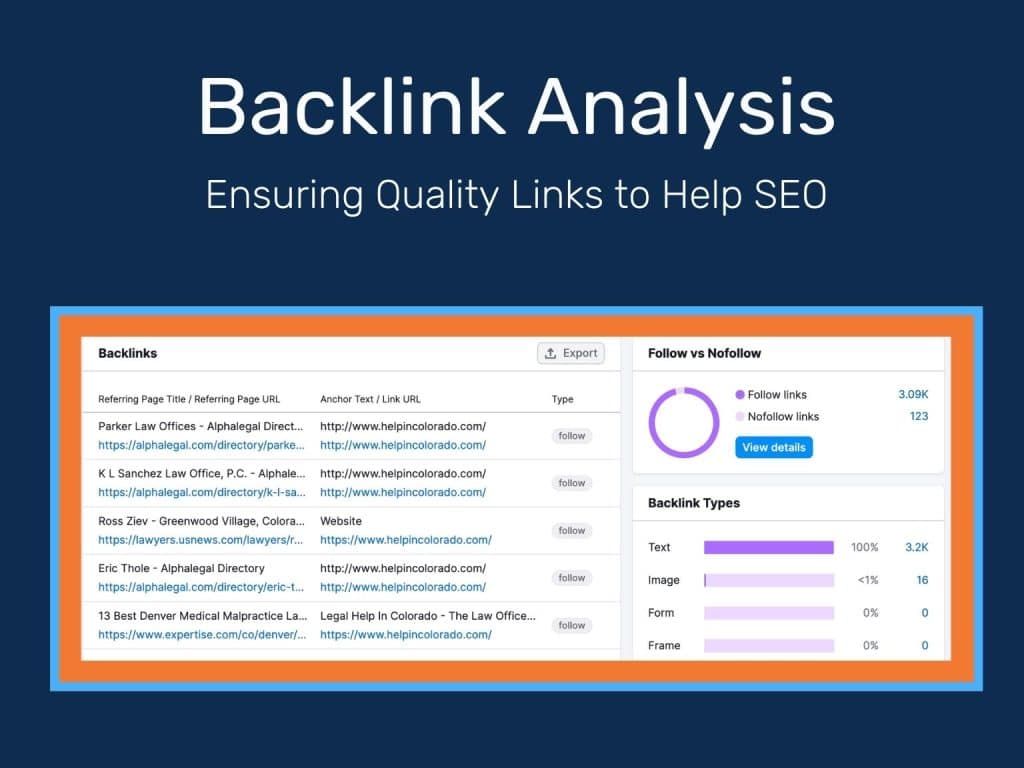
Also, you want to ensure any backlinks you receive relate to your services. For example, a backlink in an article discussing car insurance is much more relevant than a link in the middle of an op-ed about the British royal family. Topical context matters.
Also, the text containing your link (i.e., anchor text) must be relevant. You can use branded anchor text (meaning you’d link directly to your law firm’s name) or link to specific keywords that apply to the personal injury law services you offer (e.g., car accident attorney). The text your link is attached to matters because it provides search engines with more information about your website, and inaccurate information can confuse Google.
Content
Although the main objective of any SEO strategy is to draw traffic to your homepage so you can convert clicks into clients, you’ll need quality content to go along with these efforts.
When you think about your personal injury law content strategy, you don’t just want to add random blog posts to your site. Instead, you want to carefully consider potential clients’ questions and answer them with highly structured, well-written posts that will soar to the top of search results and drive traffic to your website.
When our SEO team maps out content strategy, they use a combination of approaches to determine what posts will benefit a site the most. They will do this by using SEO tools like SEMRush to find high-volume keyphrases and questions, comparing your website’s content against local competitors, and keeping an eye on industry news to identify trends worth pursuing.
SEO Keywords for Personal Injury Lawyers
Part of any solid SEO strategy is keyword research. These are some of the most prominent keywords personal injury lawyers use to draw traffic to their sites.

In addition to these keywords, you can create keyword variations for local SEO purposes. These variations often add your geographic location (ex. Denver) or a more generic location modifier (near me) to draw local traffic. This strategy is great for your law firm’s homepage or service pages.
You can also vary interchangeable terms (lawyer, law firm, attorney) to create keyword variations so you don’t oversaturate a page with the same keyphrase repeatedly. We call this “over-optimizing.” The Google gods don’t look too fondly on this!
Local SEO for Personal Injury Lawyers
Personal injury law is very much a local business. This means that you can’t focus all your efforts on optimizing your website—you also need to invest time into more localized SEO.
Like general SEO, local SEO helps boost your law firm’s appearance in search results. However, the key difference is that local SEO helps you rank well for any localized search queries such as “personal injury lawyer near me” or “personal injury lawyers in [location].” This helps you rank when people search for personal injury lawyers in your area and can help you gain a spot in the top three positions for local Google Maps listings.
When focusing on local SEO for your personal injury firm, you’ll want to focus on three key areas: your Google Business Profile, local content opportunities, and online directories or citations.
Google Business Profile
A Google Business Profile is a free tool that lets you control how your business appears in Google Maps and Google Search. You can specify your services, upload images related to your firm, and respond to reviews clients leave for your law firm on Google.
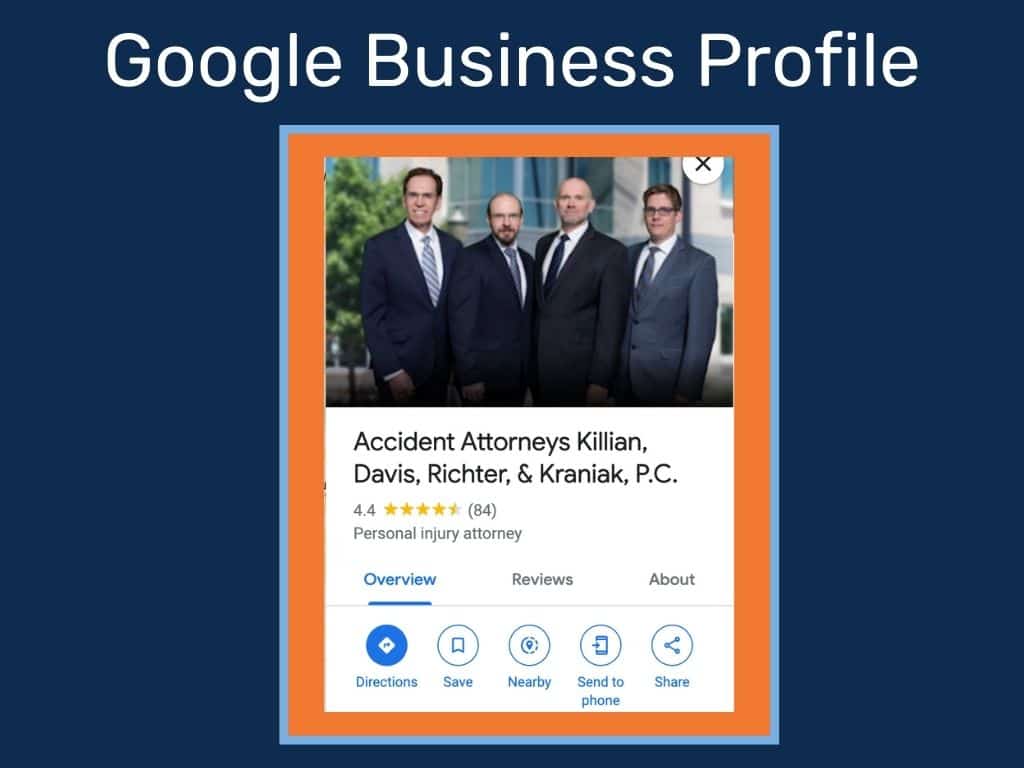
Just like with your website, you can optimize your Google Business Profile to boost your appearance against local competitors. The more information you enter into your GBP, the better your chances are of appearing well in search results. You can enter descriptions for your business as well as each service you offer, meaning you can specify the types of personal injury law you specialize in and leverage this to stand out for specific personal injury law keywords.
Furthermore, a solid Google Business Profile with positive client reviews can help elevate your law firm’s credibility and trustworthiness. Since 81 percent of people rely on Google reviews to inform their decision for service industries [4], these reviews could make a huge difference for your business.
Local Content
In addition to shoring up your Google Business Profile, you can also win points in local SEO by generating local content. This content will focus on locations near you and specific issues potential clients face because of your geographic location.
For example, if you are having trouble appearing in local search results for personal injury law because a larger law firm from a major city over an hour away is spending more on paid advertisements that target your zip code, you can overcome this by adding a page to your website that specifically speaks to locals. This page can call out specific intersections that are known for car accidents, discuss local cases you’ve won, or include other information that will demonstrate your expertise in both personal injury law and your local area.
Similarly, if you aren’t showing up for specific types of personal injury law in your area (e.g., motorcycle accidents), you can focus your content strategy on writing a series of blog posts about motorcycle accident statistics in your area, specific motorcycle laws issued by your state or local government, and other questions clients may have about motorcycle crashes in your town. All of this content will boost your relevance and credibility, which will translate into higher search engine rankings for your website.
Online Directories & Citations
Although people don’t use the Yellow Pages anymore, they do use online directories to find businesses. Typically, these directories are published on third-party websites with titles like “Best Personal Injury Lawyers in Denver” and list several personal injury law firms in the area. Appearing on these lists can really help your local SEO efforts, and may give you a leg up on competitors who aren’t listed.
Typically, law firms with solid websites who appear at the top of search engine results will gain spots on these lists naturally, since someone takes the time to research and compile data for online directories. However, even if you aren’t listed on one or more of these lists right now, you can work your way onto them with some focused effort. In fact, agencies like InSync Media often have experience in helping businesses land on online directories or have connections with companies who generate these citation lists that we can leverage to add you to relevant directories for your law office.
Once your business is listed on several of these directories, both Google and other citation lists will pick up on the trend and boost you even more in local search.
How the Right Agency Can Help Boost SEO for Personal Injury Firms
There are hundreds of people looking for a personal injury lawyer every day. Are you positioned at the top of Google search to be their first choice?
At InSync Media, we know it is not about just being visible. It is about being visible to the right people. Unfortunately, without the right approach to local SEO, your efforts to climb to the top may not yield the results you hoped for.
Leveraging the unique approach discussed in this very blog post, we’ve helped the Grand Junction-based Killian Law Firm get these results:
- 99 Map #1 Positions
- 87% of all search visibility
- 157 Map Top 3 positions
In short: the amount of competition in the area no longer stops this small personal injury law firm from reaching new clients, and we’d love to help you reach similar goals.
Are you ready to see how the right marketing agency can help you reach more clients and blow your competition out of the water? Just send us a message and let us take a look at what we can do for your firm.
Resources
[1] https://neilpatel.com/blog/first-page-google/
[2] https://seoexpertbrad.com/local-seo-stats/
[3] https://www.natlawreview.com/article/legal-marketing-stats-lawyers-need-to-know
[4] https://explodingtopics.com/blog/online-review-stats
